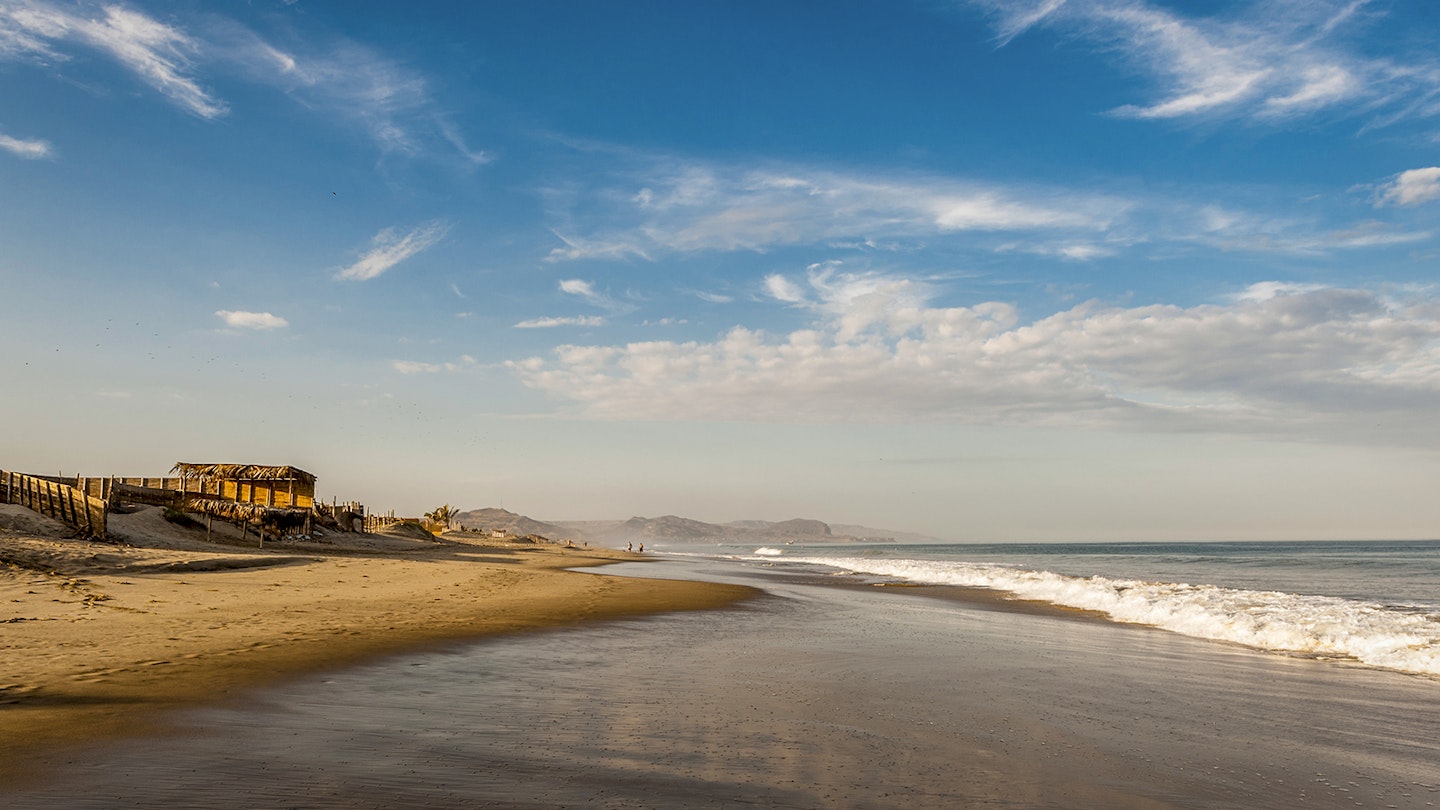Explore the Northern Coast of Peru
While many travelers venture to Peru for its rainforests and majestic mountain ranges, the country’s dramatic northern coast is a unique treasure waiting to be discovered. Merging surf and sunshine with pristine beaches, chic accommodations, and delicious seafood sets the stage for a perfect beach getaway. Moreover, if you can pry yourself away from the inviting beach lounges, a wealth of ancient archaeology is ripe for exploration.

Peru is celebrated as one of the world’s best surfing destinations. The northern coastline is bathed in the consistent Pacific swell, extending across 1,000 km. Furthermore, unlike the fog-laden southern coast, this region enjoys nearly all year round of sunny, desert-like weather.
Top Spots to Visit on Peru’s Northern Coast

Huanchaco
Huanchaco is renowned as the birthplace of surfing. Located 560 km north of Lima, you can stroll the beach and encounter one-man boats, referred to as caballitos de totora, still utilized by local fishermen. After fishing, these fishermen surf home on their caballitos, a practice documented in pottery vessels that are over 3,000 years old. For a few soles, fishermen are willing to take passengers out for fishing or surfing experiences, followed by indulging in fresh seafood at beachfront restaurants.
Las Pocitas
The lively coastal town of Mancora, located 1,200 km north of Lima, is not the only highlight of the area; the stunning beaches to the south offer a delightful beach holiday experience. At Las Pocitas, a short distance from Mancora, consider staying at the stylish Hotel DCO, complete with Instagram-worthy aesthetics. Alternatively, the relaxed Casa de Playa features excellent seafood dining, perfect for savoring ceviche. Expect beachside cocktail service and sunset horseback rides, with rock pools to explore and lessons for surfing and kitesurfing available for the kids.

Vichayito, Los Organos, and Punta Veleros
Situated 6 to 10 km south of Las Pocitas, the charming fishing villages of Vichayito, Los Organos, and Punta Veleros offer a more tranquil experience, great for families, as many accommodations are equipped with lovely pools. While Punta Veleros attracts surfers, there are numerous watery activities to experience, including windsurfing, kitesurfing, snorkeling, and diving. On land, visitors can enjoy horseback riding, explore scenic walking trails, or birdwatch at the nearby El Encanto mountain. Additionally, if relaxation is your priority, consider visiting Spa Origenes, and stay at the well-regarded Soleil Bungalows.
Punta Sal
Punta Sal, located just north of Mancora, is known for its typically calm waters and family-friendly beach. Consider the upscale Punta Sal Club Hotel as your base, from where you can venture north to the Caleta de la Cruz de Pizarro, the historical landing spot of Francisco Pizarro and his conquistadors in 1535. Furthermore, the plentiful deep waters of Punta Sal are renowned for game fishing, providing opportunities to catch marlin, tuna, wahoo, or dorado.

Chicama
Chicama is famous for boasting the longest wave in the world, stretching up to one mile. Known for its remarkable speed, cleanliness, and sheer excitement, Chicama is located approximately 80 km north of Huanchaco, situated amidst a stark desert backdrop. Rent a board or enjoy a stay at Chicama Surf Hotel and Spa, where non-surfers can also relax by the pool. Nearby ancient ruins offer additional exploration opportunities for the curious visitor.
Cabo Blanco
The legendary Cabo Blanco has a storied history, notably attracting Hemingway in the past. The region was once famous for its gigantic black marlin, rumored to have inspired Hemingway’s novel The Old Man and the Sea. Though several deep-sea fishing boats continue to operate here, focusing mostly on catching black and striped marlin, mahi mahi, and tuna, the area is primarily a hub for commercial fishing. From November to January, Cabo Blanco presents an ideal pipeline wave—caution is advised, as it is suited for experienced surfers only.

Chan Chan, Huacas del Sol y de la Luna, Sipan, and El Brujo
The northern coast of Peru is rich in pre-Colombian archaeological wonders, most accessible from the colonial town of Trujillo. The Chan Chan site, built by the Chimu culture, was the largest pre-Colombian city in South America. In addition, the Huaca del Sol and Huaca de la Luna (Temples of the Sun and the Moon) date back to the earlier Moche culture. The recently unearthed tomb at Sipan has yielded significant Moche gold treasures, complemented by an informative new museum at El Brujo that enhances the visit to this compelling site. Multilingual guides are available to elaborate on the significance of these fascinating locales, making it a worthwhile excursion before they degrade further in the face of more severe El Niño flooding.




